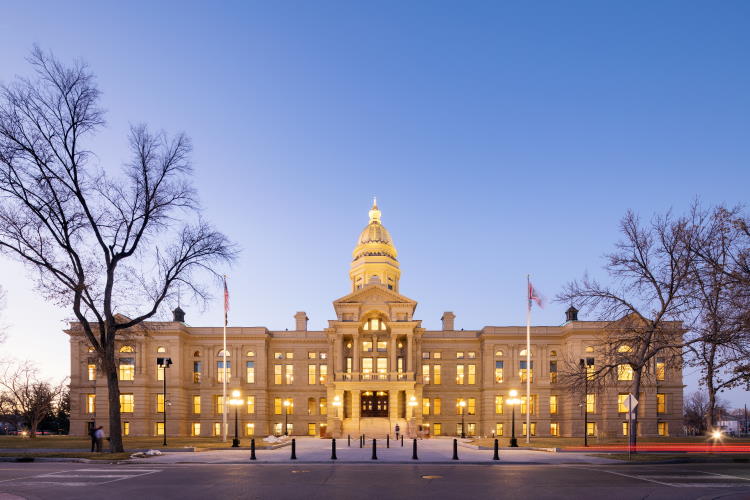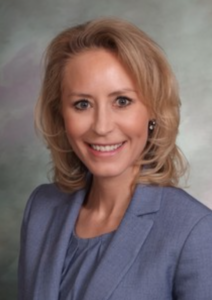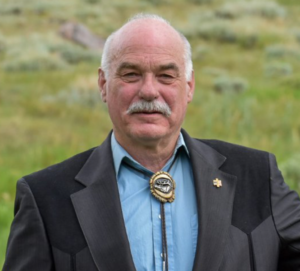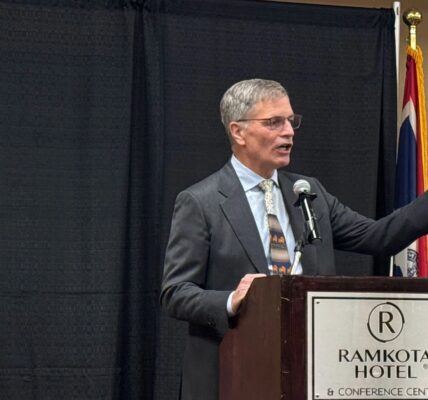
By Maggie Mullen, WyoFile.com
A WyoFile investigation of the three candidates vying to be Wyoming’s next secretary of state reveals marked differences in professional experience, political backing and even history of compliance with the very laws and regulations enforced by the office in question.
Secretary of state is the second highest office in Wyoming’s executive branch behind only the governor.
The four-year position oversees elections; registers and authorizes businesses operating in the state; records state agencies’ rules and the proceedings of the Wyoming Legislature; regulates the state’s securities industry and enforces securities law; and serves as Wyoming’s de facto lieutenant governor, ready to step in should the governor die, leave office or be unable to fulfill duties.
The secretary also serves on the powerful State Board of Land Commissioners, State Building Commission, State Loan and Investment Board and as the chair of the State Canvassing Board.
WyoFile sought interviews with all candidates and submitted written questions when requested. The same original request for academic and professional experience was asked of each candidate along with follow-up questions that varied depending on the candidates’ initial responses. Staff also relied on public records tied to the professional endeavors and commercial enterprises of the candidates.
The race has largely been defined by the office’s election related duties, in part because of the disproven but popular conspiracy theory that massive voter fraud decided the 2020 presidential election, and in part by some candidates’ insinuations, without evidence, that Wyoming’s elections are not secure. WyoFile examined that aspect of the contest in previous reporting, but chose to focus here on the other duties of the office to offer readers a greater understanding of the position and a broader knowledge of the candidates.

Rep. Chuck Gray (R-Casper) declined to answer questions about his employment, professional experience or other qualifying attributes for the complex job.
Gray has represented House District 57 in the Wyoming Legislature since 2017.
He has listed Mount Rushmore Broadcasting, Inc. as his sole employment — initially working as a program director, then later as an operations manager — on each of his requisite elected official
According to records from the secretary of state’s office — and later confirmed by a department spokesperson — Mount Rushmore Broadcasting was administratively dissolved by the state almost two decades ago for failing to file annual reports and pay its license fees to Wyoming. Gray’s father, Jan Charles Gray, is president of the Delaware-based entity, according to state records. The entity uses a registered agent in its Wyoming filings, but 2016 documents from the Federal Communications Commission indicate that the elder Gray is also owner of the corporation.
Like all out-of-state entities, it was required to obtain a certificate of authority from the secretary of state’s office before transacting business in the state. It did so in 1993, according to state records, but failed to file requisite annual reports and pay yearly fees based on its assets located and employed in Wyoming. Mount Rushmore entered into a 24-month period during which it could have paid a reinstatement fee, as well as what was already owed. But the company did not comply within the two-year window, after which Wyoming statute does not allow entities to be brought back into good standing.
Monique Meese with the Wyoming Secretary of State’s office confirmed that Mount Rushmore Broadcasting, Inc. was administratively dissolved on June 10, 2003 and thereby lost the ability to be reinstated. At press time, the entity was not under review by the office, Meese said, because no written complaints had been submitted.
On his most recent state elected officials financial disclosure form dated Jan. 28, 2022, Gray listed operations manager of Mount Rushmore Broadcasting as his employment. According to his campaign website, he began his career there in 2013 “as a radio executive and hosted a conservative radio show,” until 2019.
During a July candidate forum in Casper, Gray said he became a permanent resident of Wyoming in 2012. He spent his childhood summers here with his father after his parents divorced, he said.
Prior to going to work for his father, Gray graduated from the University of Pennsylvania with bachelor’s of science and bachelor’s of arts degrees, according to his lawmaker bio.
When WyoFile approached Gray to clarify his professional experience immediately following the forum in Casper, he declined to answer questions, but said he would respond to written questions over email. WyoFile sent several written questions to the lawmaker, including a request for more details regarding his duties as an employee of Mount Rushmore Broadcasting and how his academic and professional resumes qualified him for the position. Gray responded with a statement about ballot drop boxes and ballot harvesting — he feels both are threats to election integrity — but no further information on his background. WyoFile sent a subsequent email asking about his employer conducting business in Wyoming without a certificate of authority. The lawmaker did not respond.
Mount Rushmore Broadcasting is currently the licensee for two AM stations and five FM stations in Wyoming, according to Federal Communications Commission records. Most of those stations are in Casper, and all but one of those can currently be heard on the air.
In 2016, three years after Gray claims to have begun working there, Mount Rushmore entered into a consent decree with the FCC for failing to maintain a full-time management and staff presence at the main studio of two of its stations during regular business hours, among other things. One term of the settlement was a $25,000 civil penalty, which was less than the originally proposed penalty. Mount Rushmore Broadcasting submitted a sworn statement along with several years of tax returns indicating an inability to pay all forfeitures, according to the consent decree. The original amount was just under $160,000, according to the FCC. Part of the agreement required Mount Rushmore Broadcasting to pay the remainder of the originally proposed penalties if the FCC found it misled the commission regarding its financial status. The commission declined to say whether that occurred.
In 2015, Mount Rushmore Broadcasting paid almost $5,000 in back wages to former employees, after the U.S. Department of Labor sued the entity for not properly paying its workers.
Between April 2020 and March 2021, it received more than $28,000 in federal dollars through the Paycheck Protection Program in order to retain two jobs. Gray, a vocal opponent of federal subsidies, voted during the 2022 Legislative session against a bill authorizing the state to spend other pandemic relief funds. He declined to answer questions on the matter when WyoFile contacted him for previous reporting.
Jan Charles Gray did not respond to multiple requests for comment about Mount Rushmore Broadcasting.
Chuck Gray’s campaign finances and personal resources have recently been challenged. Last week, former Wyoming Secretary of State Max Maxfield filed a complaint with the Federal Election Commission, raising questions about how a candidate who reports an annual income of around $10,000 could loan his own campaign almost $300,000. At a debate in Casper earlier this week, Gray said he inherited the money from his grandfather.
“In my experience, the known facts do not add up. It is apparent to me that there are additional facts that must be discovered. I am asking the FEC to uncover those facts,” Maxfield said in the complaint.
Gray’s financial dealings disqualify him from the job, according to one of his opponents, Sen. Tara Nethercott (R-Cheyenne).
“No one who is hiding and failing to disclose that amount of money to his own campaign should be the head of Wyoming elections,” Nethercott said in a press release. Nethercott has been endorsed by Maxfield.
Former President Donald Trump has endorsed Gray’s candidacy, as have Reps. John Bear (R-Gillette), Jeremy Haroldson (R-Wheatland), Mark Jennings (R-Sheridan) and Wyoming State Treasurer Curt Meier. Gun Owners of America have also endorsed him.

Sen. Nethercott, a Cheyenne attorney, has represented Senate District 4 since 2017.
Since 2013, Nethercott has been late six times to file annual reports with Wyoming for her in-state corporation, Tara B. Nethercott, P.C. At no point did she exceed the 24-month compliance window, and the attorney’s business remains in good standing, according to state records. Nethercott is also properly authorized to practice law in the state, according to Wyoming state bar records, and has no history of disciplinary charges or public discipline.
After growing up in Fremont County, Nethercott said she earned three degrees from the University of Wyoming, including her Juris Doctorate in 2009. From there, she said she began a private practice in Cheyenne and spent about a decade with Woodhouse Roden Nethercott. The firm relied on federal pandemic relief through a PPP loan of $111,000 in order to retain nine employees. Nethercott voted against the same ARPA allocation bill that Gray did, but said her vote was due to what was left out of the bill and she would not have voted against it had the vote been closer.
She currently practices with Crowley Fleck, and much of her legal work involves business organizations, according to the lawmaker.
“I am the most qualified candidate running for a variety of reasons,” Nethercott said, pointing to her numerous leadership positions, including as co-chairperson of the Legislature’s Joint Judiciary Committee during the 66th Wyoming Legislature and chairman of the board of directors for the Greater Cheyenne Chamber of Commerce in 2018. In 2021, she was awarded Legislator of the Year by the Wyoming County Commissioners Association. The Wyoming Business Alliance gave her a similar award last week.
Along with the election and business divisions, the compliance division of the secretary of state’s office is another primary responsibility of the position. That division oversees and enforces Wyoming’s financial securities law and, for example, has the authority to file administrative actions and to refer criminal matters to local, state or federal authorities for violations of securities laws.
As an attorney, Nethercott is formally educated in securities regulation, she said. She also described having experience representing victims of financial fraud and has worked on prosecution teams on securities regulation violations.
After Sen. Dan Dockstader (R-Afton) dropped out of the race, he endorsed Nethercott. She’s also been endorsed by Wyoming’s U.S. Sen. Cynthia Lummis, Reps. Steve Harshman (R-Casper), Lloyd Larsen (R-Lander), Evan Simpson (R-Afton) and Sen. Jeff Wasserburger (R-Gillette), in addition to the Wyoming Mining Association, the Wyoming Hospitality and Travel Coalition, the Firearm Industry Trade Association, the Wyoming Association of Realtors, the Wyoming Stock Growers Association, the Petroleum Association of Wyoming and the Associated General Contractors of Wyoming.

Mark Armstrong, the third candidate in the race, has spent his career working as a geologist, and he said that’s an important distinction between him and his competitors.
“These people in government [who] aren’t scientists, they don’t know what good science is,” Armstrong said. “It’s extremely difficult to hold them accountable for inappropriate actions. And I can take care of those things as secretary of state.”
Armstrong has earned degrees from several universities, including the University of Wyoming, the Colorado School of Mines and Stanford University, he said.
In 2010, Armstrong’s license to practice geology in Wyoming expired when he did not renew it. He made the decision to let it lapse after the Wyoming Board of Professional Geologists “would not enforce a blatant ethics violation,” he said. Since then, his geology work has been based in California, where he remains professionally licensed.
Armstrong does not have legal training, but he has legal experience from a lengthy court battle with his former employer, the Wyoming Department of Environmental Quality, he said.
According to court documents, Armstrong began work in 2005 as an environmental analyst for the state agency, inspecting and issuing permits for waste facilities. While an employee, Armstrong told the director of DEQ that he thought his supervisor was improperly influencing a permitting decision involving a Casper landfill. However, the state fired Armstrong in 2007 for incurring $2,500 in personal charges on his state-issued cell phone. The state’s Office of Administrative Hearings reinstated Armstrong in 2008, but the DEQ appealed that decision. Armstrong found different work in Montana — another position related to environmental waste — but the legal battle continued, with Armstrong representing himself. Eventually, he appealed to the Wyoming Supreme Court. His case was dismissed for “failure to follow the Wyoming Rules of Appellate Procedure,” according to the opinion written by former Justice William Hill.
The way Armstrong sees it, the process gave him courtroom experience that would be valuable to the secretary of state role.
On Monday during another debate in Casper, Gray accused Nethercott of failing to disclose her campaign finance information. At the time, neither candidate had provided such information to the state.
“Our campaign reporting filings are due tomorrow. And the whole public can see them tomorrow,” Nethercott rebutted.
Gray, Nethercott and Armstrong all met the Tuesday deadline.
Gray raised almost $528,000, most of which came from direct donations from his father. Rep. Tim Hallinan (R-Gillette) and Sen. Tim French (R-Powell) also contributed to Gray’s campaign, along with influential political donors Susan Gore and Dan and Carleen Brophy.
Nethercott raised almost $333,000, including a loan from herself for $95,000. Nearly $9,000 came from her statehouse colleagues, including Speaker of the House Eric Barlow (R-Gillette), Reps. Jared Olsen (R-Cheyenne), Albert Sommers (R-Pinedale), Don Burkhart (R-Rawlins), Mark Kinner (R-Sheridan), Pat Sweeney (R-Casper), Jim Roscoe (I-Wilson), Steven Pappas (R-Cheyenne) and Sens. Ogden Driskill (R-Devils Tower), and Charles Scott (R-Casper). Sen. Dave Kinskey (R-Sheridan) also gave Nethercott an in-kind donation.
Armstrong’s total contributions came in just under $5,300.
The primary is Aug. 16 with early voting already underway.




